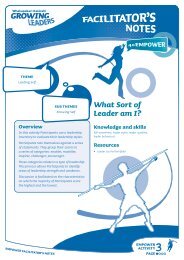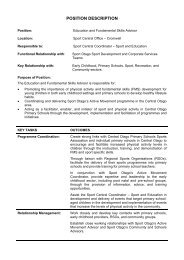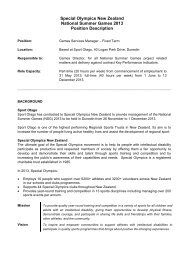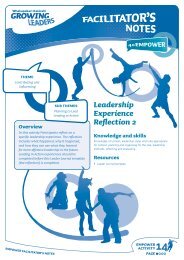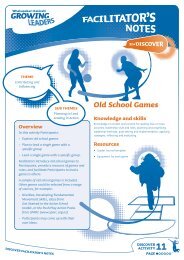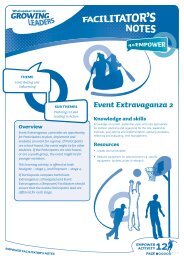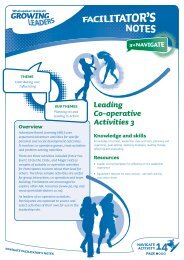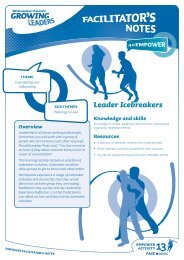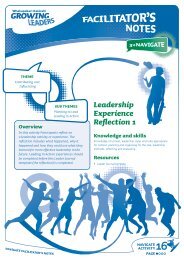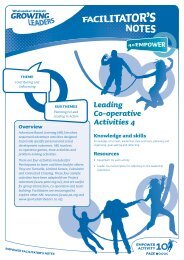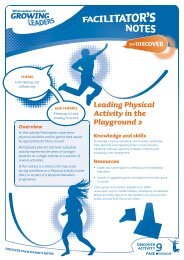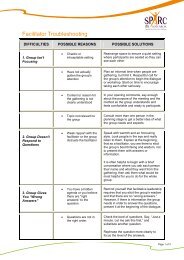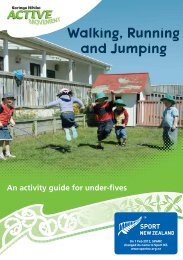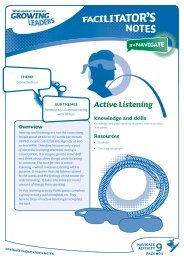Read Getting Set for an Active Nation - Sport New Zealand
Read Getting Set for an Active Nation - Sport New Zealand
Read Getting Set for an Active Nation - Sport New Zealand
Create successful ePaper yourself
Turn your PDF publications into a flip-book with our unique Google optimized e-Paper software.
as tennis, rowing, c<strong>an</strong>oeing, shearing, wood chopping, yachting, equestri<strong>an</strong>, mountaineering,<br />
triathlon, <strong>an</strong>d squash have seen world champions emerge from <strong>New</strong> Zeal<strong>an</strong>d. Technology<br />
<strong>an</strong>d international competition have become inextricably linked with commercialism <strong>an</strong>d<br />
sponsorship, which has been apparent in such ventures as the America’s Cup, held by a <strong>New</strong><br />
Zeal<strong>an</strong>d syndicate at the time of this report.<br />
Elite sport in the post-World War II decades saw special achievements of athletes, sailors,<br />
rugby teams, paralympi<strong>an</strong>s, equestri<strong>an</strong>s, <strong>an</strong>d m<strong>an</strong>y other singular sports people from Williams<br />
to Loader, Devoy to Waddell. At the elite level, the 2000 Sydney Olympic Games results<br />
focused the magnifying glass of public scrutiny upon the support, selection <strong>an</strong>d preparation of<br />
<strong>New</strong> Zeal<strong>an</strong>d’s elite athletes. The assigned expenditure fuelled discussion on the allocations<br />
<strong>for</strong> elite sport <strong>an</strong>d the neglected emphasis upon coach expertise <strong>an</strong>d development. Result<strong>an</strong>t<br />
debates over sport structures <strong>an</strong>d targeted expenditure have underscored the role of the<br />
Ministerial Task<strong>for</strong>ce on <strong>Sport</strong>, Fitness <strong>an</strong>d Leisure in late 2000.<br />
Signific<strong>an</strong>t in the development of <strong>New</strong> Zeal<strong>an</strong>d recreation <strong>an</strong>d sport has been its shaping <strong>an</strong>d<br />
construction by the media. The international reach of television, especially, has presented<br />
Americ<strong>an</strong> basketball, boxers <strong>an</strong>d track stars in <strong>New</strong> Zeal<strong>an</strong>d homes more readily th<strong>an</strong> most<br />
<strong>New</strong> Zeal<strong>an</strong>d sports have been able to achieve.<br />
In terms of participation rates, there are suggestions that fewer <strong>New</strong> Zeal<strong>an</strong>ders are playing<br />
sport <strong>an</strong>d that this is more evident in the 40+ age group. The <strong>New</strong> Zeal<strong>an</strong>ders most likely to<br />
be actively engaged in sport are aged 15-29 years <strong>an</strong>d in households earning less th<strong>an</strong><br />
$30,000, or over $70,000. The less involved are women, older <strong>New</strong> Zeal<strong>an</strong>ders <strong>an</strong>d people<br />
living in the upper North Isl<strong>an</strong>d.<br />
Figures on <strong>New</strong> Zeal<strong>an</strong>ders’ levels of activity are not always definitive in Hillary Commission<br />
documents but its <strong>Sport</strong> <strong>an</strong>d Physical Activity Survey (1997-98) indicates one in three <strong>New</strong><br />
Zeal<strong>an</strong>ders is physically inactive, with males being more active th<strong>an</strong> females. Despite <strong>New</strong><br />
Zeal<strong>an</strong>d’s image of <strong>an</strong> active outdoor environment there are real “constraints to leisure”<br />
(Genet, 2000) felt by urb<strong>an</strong> residents at least.<br />
<strong>Sport</strong> has become a major consideration in the social <strong>an</strong>d economic life of <strong>New</strong> Zeal<strong>an</strong>d. It<br />
has, arguably, become justified less on grounds of social <strong>an</strong>d moral values th<strong>an</strong> as the domain<br />
of fitness, commercial imperatives <strong>an</strong>d br<strong>an</strong>ding. In 2000 AD recreation <strong>an</strong>d sport may be<br />
viewed signific<strong>an</strong>tly through the lens of the media, vested commercial interests, the “amateurprofessional”<br />
debate, or bound up with international competition, politics, funding, national<br />
prestige, or the subtle <strong>for</strong>ces of symbolism. These have all been illustrated in the<br />
establishment of the Warrior’s rugby league team, the Kingz soccer team, Super 12 rugby <strong>an</strong>d<br />
part-professional netball in the late 1990s. At the grassroots of <strong>New</strong> Zeal<strong>an</strong>d recreation <strong>an</strong>d<br />
sport the clubs, volunteers <strong>an</strong>d schools <strong>an</strong>d diverse <strong>for</strong>ms of participation continue to seed the<br />
involvement of <strong>New</strong> Zeal<strong>an</strong>ders in this vital sector of <strong>New</strong> Zeal<strong>an</strong>d life.<br />
Ch<strong>an</strong>ges in sport, fitness <strong>an</strong>d leisure through the 1970s, 1980s <strong>an</strong>d 1990s revealed:<br />
• Shifts in societal attitudes.<br />
• The impact of international media.<br />
• <strong>Sport</strong> org<strong>an</strong>isations with variable m<strong>an</strong>agement capabilities.<br />
• Variable numbers of volunteer participation.<br />
Ministerial Task<strong>for</strong>ce on <strong>Sport</strong>, Fitness & Leisure J<strong>an</strong>uary 2001 page 22 of 153



